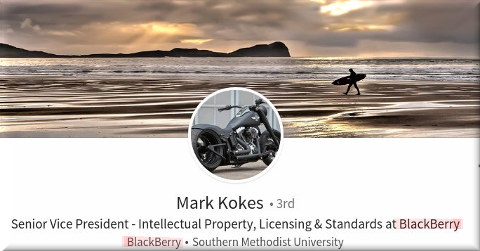

THE SCOTUS 'gift' which was 35 U.S.C. ۤ 101/Alice (2014) has been no gift to BlackBerry, which now relies on poor-quality patents, granted by the USPTO by the tens of thousands.
"So BlackBerry is finding out that its software patents are worthless."Over the past week we've seen this Canadian 'troll' (some experts actually call it that these days) losing its patents. Yes, BlackBerry is struggling also to 'monetise' its patents, having long struggled to sell actual products.
As patent maximalists put it some days ago:
Three BlackBerry patents have been invalidated in four IPRs brought by Google, while two more IPRs relating to another BlackBerry patent are pending
Alphabet Inc.'s Google has knocked out two BlackBerry Ltd. patents on technology that helps users navigate mobile device screens.
BlackBerry’s user-interface patents were obvious and unpatentable as they were covered by previous inventions, the Patent Trial and Appeal Board ruled Aug. 29. The ruling comes a day after the administrative board also invalidated BlackBerry’s patent on instant message time stamps.
Google’s patent review challenges and BlackBerry’s infringement lawsuits against companies such as Facebook Inc. and Snap Inc. test the strength of BlackBerry’s patents. BlackBerry is looking to leverage its 40,000 patents to revive revenue growth. Its patent licensing revenue made up nearly 30% of the 2019 fiscal first quarter revenue of $213 million.
Google challenged four BlackBerry patents last year. Google, which now has killed three of them, is awaiting a board decision on its remaining challenge on a patent covering software security.
Last week, the U.S. District Court for the Central District of California ruled that claims related to providing time data for messages communicated between electronic devices in a messaging conversation are patent ineligible under 35 U.S.C. ۤ 101.
Back in March, BlackBerry Limited ("BlackBerry") filed suit against Facebook, Inc., WhatsApp, Inc., Instagram, Inc., and Instagram, LLC (collectively, "Facebook Defendants"), alleging infringement of nine patents. BlackBerry then sued Snap, Inc. ("Snap") a month later alleging infringement of six of those nine patents. The Defendants in each of these suits each moved to dismiss their respective cases. Snap moved on the basis that each of the six asserted patents are patent-ineligible. The Facebook Defendants moved on the basis that four of the nine asserted patents in that suit are patent-ineligible. The Court's ruling addressed seven of the nine patents, three of which were common between the two suits. In particular, the Court granted Snap's motion with prejudice as to the independent claims of asserted U.S. Patent No. 8,301,713 (the '713 patent) and otherwise denied all other motions, including Snap's movement with respect to the dependent claims of the '713 patent. This post addresses only the ruling on the '713 patent.
"...had all software patents been voided as ineligible (or no longer eligible) a lot of spurious, frivolous litigation such as BlackBerry's would be immediately eliminated."Daniel Nazer (EFF) has meanwhile condemned Google again, reaffirming our claims that it's wrong to associate the EFF with Google (as patent maximalists like to do, having blamed their woes on Google and the EFF). It's about this infamous patent application, which is an attempt at software patenting with prior art in the Public Domain. In the words of the EFF, "After Patent Office Rejection, It is Time For Google To Abandon Its Attempt to Patent Use of Public Domain Algorithm" (we'd go further and suggest Google stops its patent aggression, too).
At EFF, we often criticize software patents that claim small variations on known techniques. These include a patent on updating software over the Internet, a patent on out-of-office email, and a patent on storing data in a database. Now, Google is trying to patent the use of a known data compression algorithm - called asymmetric numeral systems (ANS) – for video compression. In one sense, this patent application is fairly typical. The system seems designed to encourage tech giants to flood the Patent Office with applications for every little thing they do. Google’s application stands out, however, because the real inventor of ANS did everything he could to dedicate his work to the public domain.
Jarek Duda developed ANS from 2006-2013. When he published his work, he wanted it to be available to the public free of restrictions. So he was disappointed to learn that Google was trying to patent the use of his algorithm. In his view, Google’s patent application merely applied ANS to a standard video compression pipeline. Earlier this summer, Timothy B. Lee of Ars Technica published a detailed article about the patent application and Duda’s attempt to stop it.
This week, the Patent Office issued a non-final rejection of all claims in Google’s application. The examiner rejected the claims on a number of grounds. First, he found the three broadest claims ineligible under Alice v CLS Bank, which holds that abstract ideas do not become eligible for a patent merely because they are implemented on a generic computer. The examiner rejected all of the claims for lack of clarity and for claiming functions that are not described with sufficient detail (applicants are often able to overcome these kinds of rejections with an amendment).